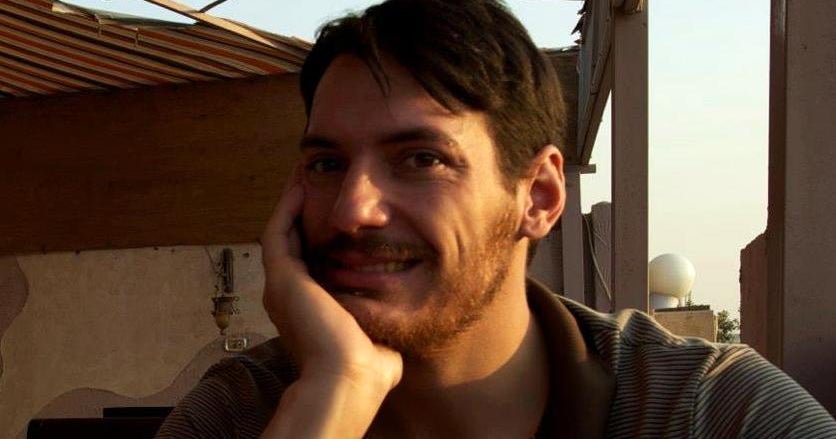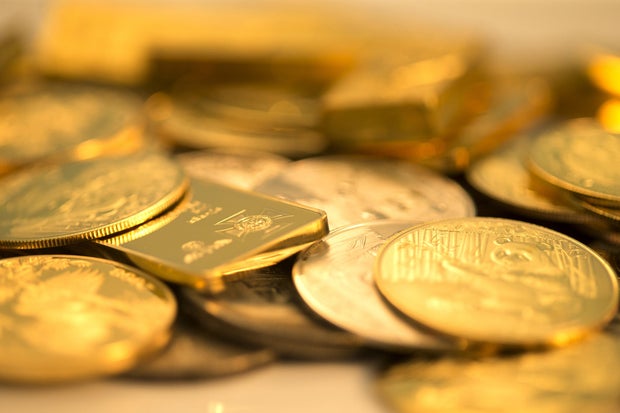CBS News
3 gold investing moves to boost your portfolio this July

ViewStock
There are many reasons to consider investing in gold right now. With high inflation, geopolitical unrest and the coming election, having a healthy safe haven allocation in your investment portfolio makes sense. And, gold is an effective way to protect your portfolio from risk.
Gold’s price has seen strong growth this year, too. After starting the year off at $2,063.73, the price of gold climbed to $2,439.98 by May 20. But that price has since cooled. Today, gold is trading at around $2,380.00 per ounce. Although that’s significantly lower than gold’s May record high, it still represents more than 15% growth year-to-date.
While there are many reasons to invest in gold, it’s important to make the right moves when you do, particularly this July.
Invest in gold now to give your portfolio a boost.
3 gold investing moves to boost your portfolio this July
You can use gold to improve your portfolio’s performance in a few ways this July. Some of the most effective include:
Focus on allocation
Gold’s price has grown quite a bit this year. And, the safe haven properties of the precious metal are valuable given the current economic, political and geopolitical climates. So, you may want to add quite a bit of the yellow metal to your portfolio. But, you shouldn’t overdo your investment.
While gold is an attractive safe haven, the stock market’s performance has been strong this year, too – the S&P 500 is up around 17% year-to-date. And, it’s important to balance your portfolio with a healthy mix of safe havens and traditional assets like stocks and bonds.
Most experts say you shouldn’t allocate more than 10% of your portfolio assets to gold. Some suggest that a 5% gold allocation is more reasonable. So, consider your investment goals, the other assets in your portfolio and how gold relates to those assets when choosing your allocation. But, in any case, keep your holdings to a maximum of 10% of your portfolio’s assets.
Take advantage of gold’s safe haven and inflation protection properties today.
Invest now
Gold’s price is down but it may not stay there for long. Gold’s price tends to go through cycles. Upward cycles are typically followed by downward cycles and vice versa. Based on the cyclical nature of gold’s price, there are two reasons why waiting to make your investment could be a mistake:
- The discount could disappear: If you buy gold now, you’ll do so at a discount to its most recent high. But, if you wait too long, that discount could disappear.
- You could be priced out: Gold isn’t a cheap commodity, even considering the current discount. And, if history is any indication, gold’s price will continue to produce long-term gains – regardless of the short-term cycles it experiences. So, if you wait too long, gold’s price could become cost-prohibitive – making it difficult to add the commodity to your portfolio later.
So, add gold to your portfolio now to take advantage of the current discount in its price and avoid any issues with being priced out of the market later.
Look for discounted options
Gold’s spot price is typically the price that’s quoted online. But, that’s not usually the price you pay when you purchase the commodity. In most cases, dealers add a markup to the spot price to generate a profit. So, it’s possible to overpay for the commodity if you’re not careful – but it’s also possible to find discounted options.
Many online gold dealers buy second-hand precious metals and resell them at a discount to their freshly-minted counterparts. And, while these products may have some imperfections and may not be the particular design you want, their value is in the weight of the gold they’re made with. So, when you look for these discounts, you could cut the cost of your gold investment while you take advantage of the benefits of adding the precious metal to your portfolio.
The bottom line
Gold is a compelling asset with valuable inflation protection and safe haven qualities. But, when you invest invest in the precious metal this July, it’s a good idea to make your investment strategically. In particular, invest now and be sure that when you do, you maintain a healthy allocation representing 10% or less of your portfolio’s value. Also, look for opportunities to buy gold at a discount. Doing so could cut the cost of your investment. Compare your options among leading gold dealers now.
CBS News
Biden’s top hostage envoy Roger Carstens in Syria to ask for help in finding Austin Tice

Roger Carstens, the Biden administration’s top official for freeing Americans held overseas, on Friday arrived in Damascus, Syria, for a high-risk mission: making the first known face-to-face contact with the caretaker government and asking for help finding missing American journalist Austin Tice.
Tice was kidnapped in Syria 12 years ago during the civil war and brutal reign of now-deposed Syrian dictator Bashar al-Assad. For years, U.S. officials have said they do not know with certainty whether Tice is still alive, where he is being held or by whom.
The State Department’s top diplomat for the Middle East, Barbara Leaf, assistant secretary of state for Near Eastern Affairs, accompanied Carstens to Damascus as a gesture of broader outreach to Hay’at Tahrir al-Sham, known as HTS, the rebel group that recently overthrew Assad’s regime and is emerging as a leading power.
Near East Senior Adviser Daniel Rubinstein was also with the delegation. They are the first American diplomats to visit Damascus in over a decade, according to a State Department spokesperson.
They plan to meet with HTS representatives to discuss transition principles endorsed by the U.S. and regional partners in Aqaba, Jordan, the spokesperson said. Secretary of State Antony Blinken traveled to Aqaba last week to meet with Middle East leaders and discuss the situation in Syria.
While finding and freeing Tice and other American citizens who disappeared under the Assad regime is the ultimate goal, U.S. officials are downplaying expectations of a breakthrough on this trip. Multiple sources told CBS News that Carstens and Leaf’s intent is to convey U.S. interests to senior HTS leaders, and learn anything they can about Tice.
Rubinstein will lead the U.S. diplomacy in Syria, engaging directly with the Syrian people and key parties in Syria, the State Department spokesperson added.
Diplomatic outreach to HTS comes in a volatile, war-torn region at an uncertain moment. Two sources even compared the potential danger to the expeditionary diplomacy practiced by the late U.S. Ambassador Christopher Stevens, who led outreach to rebels in Benghazi, Libya, in 2012 and was killed in a terrorist attack on a U.S. diplomatic compound and intelligence post.
U.S. special operations forces known as JSOC provided security for the delegation as they traveled by vehicle across the Jordanian border and on the road to Damascus. The convoy was given assurances by HTS that it would be granted safe passage while in Syria, but there remains a threat of attacks by other terrorist groups, including ISIS.
CBS News withheld publication of this story for security concerns at the State Department’s request.
Sending high-level American diplomats to Damascus represents a significant step in reopening U.S.-Syria relations following the fall of the Assad regime less than two weeks ago. Operations at the U.S. embassy in Damascus have been suspended since 2012, shortly after the Assad regime brutally repressed an uprising that became a 14-year civil war and spawned 13 million Syrians to flee the country in one of the largest humanitarian disasters in the world.
The U.S. formally designated HTS, which had ties to al Qaeda, as a foreign terrorist organization in 2018. Its leader, Mohammed al Jolani, was designated as a terrorist by the US in 2013 and prior to that served time in a US prison in Iraq.
Since toppling Assad, HTS has publicly signaled interest in a new more moderate trajectory. Al Jolani even shed his nom de guerre and now uses his legal name, Ahmed al-Sharaa.
U.S. sanctions on HTS linked to those terrorist designations complicate outreach somewhat, but they haven’t prevented American officials from making direct contact with HTS at the direction of President Biden. Blinken recently confirmed that U.S. officials were in touch with HTS representatives prior to Carstens and Leaf’s visit.
“We’ve heard positive statements coming from Mr. Jolani, the leader of HTS,” Blinken told Bloomberg News on Thursday. “But what everyone is focused on is what’s actually happening on the ground, what are they doing? Are they working to build a transition in Syria that brings everyone in?”
In that same interview, Blinken also seemed to dangle the possibility that the U.S. could help lift sanctions on HTS and its leader imposed by the United Nations, if HTS builds what he called an inclusive nonsectarian government and eventually holds elections. The Biden administration is not expected to lift the U.S. terrorist designation before the end of the president’s term on January 20th.
Pentagon spokesperson Pat Ryder disclosed Thursday that the U.S. currently has approximately 2,000 US troops inside of Syria as part of the mission to defeat ISIS, a far higher number than the 900 troops the Biden administration had previously acknowledged. There are at least five U.S. military bases in the north and south of the country.
The Biden administration is concerned that thousands of ISIS prisoners held at a camp known as al-Hol could be freed. It is currently guarded by the Syrian Democratic forces, Kurdish allies of the U.S. who are wary of the newly-powerful HTS. The situation on the ground is rapidly changing since Russia and Iran withdrew military support from the Assad regime, which has reset the balance of power. Turkey, which has been a sometimes problematic U.S. ally, has been a conduit to HTS and is emerging as a power broker.
A high-risk mission like this is unusual for the typically risk averse Biden administration, which has exercised consistently restrained diplomacy. Blinken approved Carstens and Leaf’s trip and relevant congressional leaders were briefed on it days ago.
“I think it’s important to have direct communication, it’s important to speak as clearly as possible, to listen, to make sure that we understand as best we can where they’re going and where they want to go,” Blinken said Thursday.
At a news conference in Moscow Thursday, Russian President Vladimir Putin said he had not yet met with Assad, who fled to Russia when his regime fell earlier this month. Putin added that he would ask Assad about Austin Tice when they do meet.
Tice, a Marine Corps veteran, worked for multiple news organizations including CBS News.
CBS News
12/19: CBS Evening News – CBS News

Watch CBS News
Be the first to know
Get browser notifications for breaking news, live events, and exclusive reporting.
CBS News
Delivering Tomorrow: talabat’s Evolution in the Middle East

Watch CBS News
Be the first to know
Get browser notifications for breaking news, live events, and exclusive reporting.



